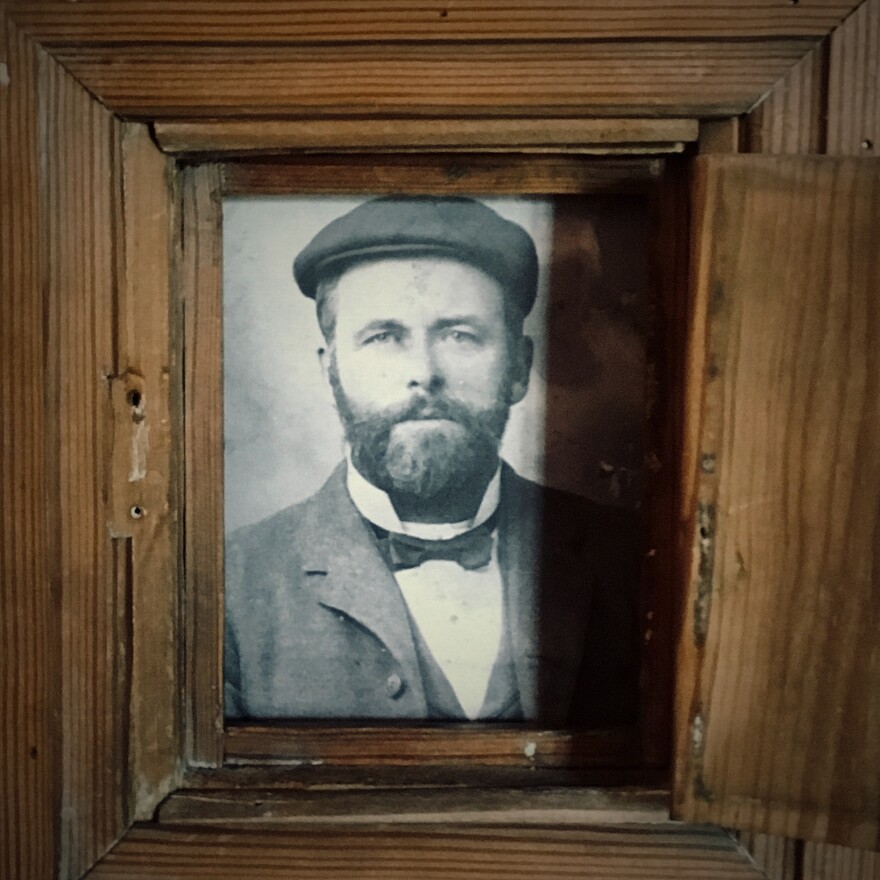In the age of Amazon, e-books, and on-demand publishing, small presses have had to make big changes to stay afloat, and Orange Frazer Press in Wilmington has become one of Ohio’s most versatile small publishers. Community Voices Producer Jason Reynolds stopped by their offices to learn how this little press that could continues to thrive after 30 years.
Main Street in Wilmington, Ohio, looks like Main Street in a lot of midwestern towns. There’s a beautiful historic theater from the city’s glory days, but there’s also a few empty storefronts downtown. Make a right, and there’s a vape shop. Make a left, there’s a pawn shop. And if you duck down the alley that runs behind Main Street, you’ll stumble upon one of Wilmington’s enormous murals.
This one looks like a scene from a Shakespeare play. On the second floor of the building, there’s a small balcony, and the muralist has painted a woman in a gown on that balcony. She has one hand on the railing and the other on the wall, in a way that suggests she’s about to climb over--to escape or elope.
These are the offices of Orange Frazer Press and Publisher Marcy Hawley.
“Most publishers our size don’t exist anymore,” Hawley says, “because they haven’t been able to make it or they’ve been purchased by the larger book publishing companies. We’ve just stayed independent, and we feel like we’re rather hybrid.”
By hybrid, Hawley means that Orange Frazer is both a traditional publisher and a custom publisher. They make custom books for big companies, and promotional books for arts organizations. They help poets, artists, and children's authors self-publish, but the press started out slowly.

Marcy Hawley and Orange Frazer Editor John Baskin worked at Ohio Magazine in the 1980s. The magazine asked them to make a book of quirky Ohio history. It was called Ohio Matters of Fact and included things like the state’s history of astonishingly large fruits and vegetables.
For example, in 1842, a man named Isaac Price grew “a Pumpkin 7 feet in circumference which produced 170 pounds of seeds.”
The magazine’s publisher let the book languish, which inspired Hawley and some of her colleagues to take action.
“It was our baby,” Hawley says. “So, we bought it back from them, and we put it in the trunks of our cars and we drove around to all the independent bookstores. It went into four printings. We sold them all, and we thought ‘maybe we have something here.’”
They started making a book a year and soon left the magazine for publishing. These days, instead of indie bookstores, the Internet is the place for a lot of Orange Frazer’s promotions and sales. And books about sports have been some of their biggest successes.
When Orange Frazer released the autobiography of Cincinnati Bengal Chad Johnson, 2,000 people came to his book signing on Main Street. The city had to close the road to accommodate everyone.
The press has also released books by Phil Nuxhall, Johnny Bench, and other area sports legends.
Hawley’s two daughters work with her now. Her daughter Margaret Morgan is the first point of contact for most Orange Frazer authors.
Often times, writers are looking for a traditional publisher, where the house takes on the risk, but Orange Frazer has had a lot of luck helping people self-publish and build a following.
Morgan says that she spends a lot of time “explaining the difference between traditional and custom publishing, and how difficult it is to get an agent, how difficult it is to get into one of the big six publishers.”
She advises a lot of first-time authors to go with a small print run and develop a following, which may make them “more attractive to a big publisher.”

Orange Frazer also makes custom books for corporations and nonprofits. These books might be given away or sold at retail, or both.
Rick Kennedy wrote the book on GE Jet Engines. I mean that literally. GE Aviation is celebrating its centennial this year. That wing of GE incorporated in Dayton in 1919. When they wanted a book to commemorate the anniversary, they asked Kennedy, a thirty-year veteran of the company, to write it. And Kennedy quickly turned to Orange Frazer.
“When I had the opportunity to write this book, there was no question I was going to work with Orange Frazer press,” he says. “Because they take these books very personally, and they just give them a very charming, a unique feel. You can always tell an Orange Frazer book when you pick one up.”
Kennedy says the GE book contains over 200 photos, and each one was laid out perfectly. He says that detail and caring is something Orange Frazer provides from concept to completion.
“You go there to discuss a book. Marcy takes you into this quaint little dining room area, and you sit on this big couch and chat with her, and she brings you a cup of coffee and there’s all these different folks working these little rooms nearby. And it just permeates all the way through the business,” Kennedy says.

Those are the type of personal touches that have kept this small press in the pink for three decades.
And, first things last, you might be wondering where the name Orange Frazer came from. It turns out he’s one of the most colorful characters in Wilmington’s history.
He ran a grocery, had the best library in town, and was president of the bicycle club. At one point, he was the clerk of the Ohio Supreme Court. And while he never married, he did have some well documented family feuds.
His real name was Cyrus Frazer, but he didn’t like, so he became “Orange” when he was a teenager.
The name seems fitting as both the person and the press have quite the eclectic aesthetic.
This story was created at the Eichelberger Center for Community Voices at WYSO.


